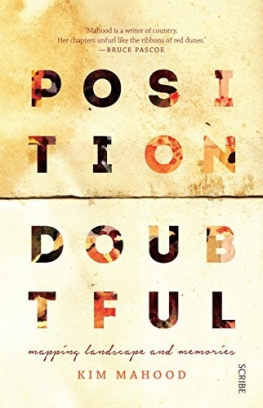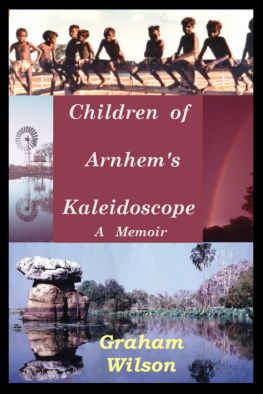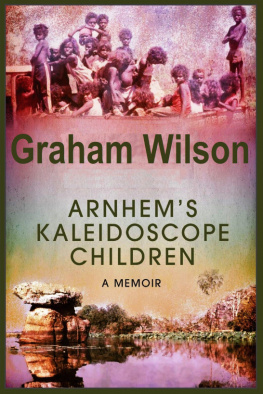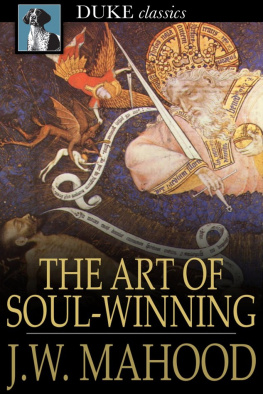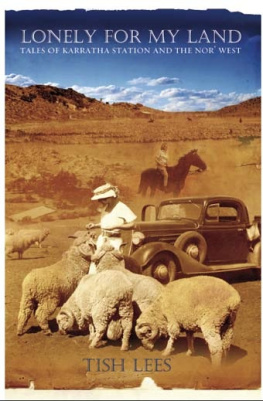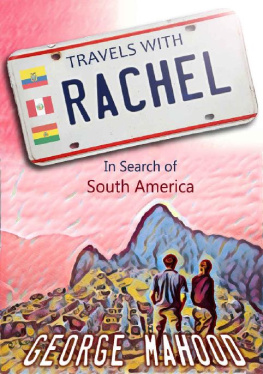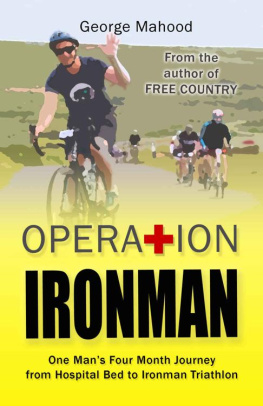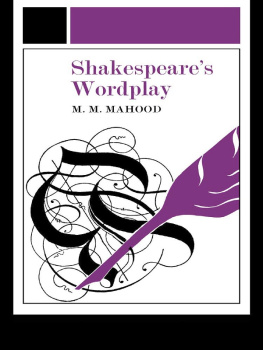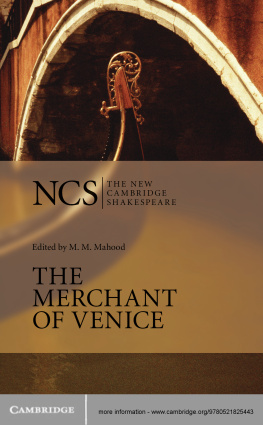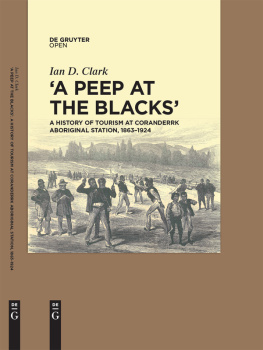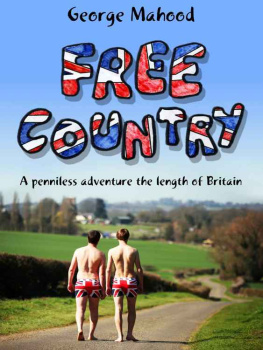
POSITION DOUBTFUL
Kim Mahood is a writer and artist based in Wamboin, near Canberra, whose 2000 memoir, Craft for a Dry Lake , won the NSW Premiers Award for non-fiction and the Age Book of the Year for non-fiction. Her artwork is held in state, territory, and regional collections, and her essays have appeared in Griffith Review , Meanjin , and Best Australian Essays . In 2013, she was awarded the Peter Blazey Fellowship for a non-fiction work in progress, and was shortlisted for the Elizabeth Jolley Short Story Prize. In 2014, she was awarded the H.C. Coombs Fellowship at the Australian National University.

Scribe Publications
1820 Edward St, Brunswick, Victoria 3056, Australia
2 John St, Clerkenwell, London, WC1N 2ES, United Kingdom
First published by Scribe 2016
Copyright Kim Mahood 2016
All rights reserved. Without limiting the rights under copyright reserved above, no part of this publication may be reproduced, stored in or introduced into a retrieval system, or transmitted, in any form or by any means (electronic, mechanical, photocopying, recording or otherwise) without the prior written permission of the publishers of this book.
Quoted material from The Way to Rainy Mountain by N. Scott Momaday, reprinted with the kind permission of the University of New Mexico Press; from Tragedy Track: the story of the Granites by F.E. Baume, reprinted with the kind permission of Hesperian Press; and from Representing Place: landscape painting and maps by Edward S. Casey, reprinted with the kind permission of University of Minnesota Press.
9781925321685 (paperback)
9781925307740 (e-book)
A CiP data entry for this title is available from the National Library of Australia.
scribepublications.com.au
scribepublications.co.uk
For Pam, Margaret, Dora, Patricia, and Anna
CONTENTS
The Remembered Earth
Once in his life a man ought to concentrate his mind upon the remembered earth, I think. He ought to give himself up to a particular landscape in his experience; to look at it from as many angles as he can, to wonder upon it, to dwell upon it.
N. Scott Momaday, The Way to Rainy Mountain
Imagine the document you have before you is not a book but a map. It is well-used, creased, and folded so that when you open it, no matter how carefully, something tears and a line that is neither latitude nor longitude opens in the hidden geography of the place you are about to enter.
You flatten it gently in the wind, find stones to weight the corners, but it is bigger than you thought: there is another fold, and another. The wind makes it impossible to open it fully, the seams are tearing, and it is apparent that if you try to look at it all at once you risk the whole thing coming apart.
The map has been annotated by more than one hand. There are marks, almost rubbed away, which have been traced over so that information will not be lost. Along the frayed creases where the map has been folded, it is no longer possible to read what is inscribed there. So you fold it into manageable sections, and search for familiar locations. Its a while since you were here, and things are not where you left them. Or maybe its your point of view thats changed.
Skeleton Valley, Running Dog Creek, Smoke Hills the names have found their way to you along a whispered thread of folklore. And there are others whose rhythms suggest a song Jarluwangu, Kaliyaka, Manyjurungu. On this map, many locations are described as Position Doubtful. If you could fold the map out fully, if it was not so fragile and the morning was still instead of windy, you could chart your course from one Position Doubtful to the next, beginning from the place where you are standing.
How many of us still feel the grip of place the long span of a life traced out in the growth of trees planted by someone you knew, a family history measured in memory and change, the sudden clutch of knowing that it will end, life and memory both, that love and sorrow cannot be separated? To learn the names of trees and grasses, the times of their seeding and flowering, the glimpse they offer into the grand slow cycles of nature, is to see your own life written there, and passing. To know the geography of a place is to know why we have always made stories in which our own human stuff is indivisible from the stones and creeks and hills and growing things.
This is a kind of love story. It is an unrequited love story, because it is between a person and a place, and a place doesnt love you back. But perhaps that isnt entirely true. Perhaps its like loving God, and what you get back is a reflection of what you put in. Apart from the deep and unequivocal love I have for my family and close friends, there has been no other love in my life as sustained as the one I have felt for a remote pocket of inland Australia.
The love I feel for the place has something in it of the passion and hunger of an affair of the heart a physical sensation in the body, a disturbance of the organs, a disorder of the mind. When Im there, Im alive with an intensity I feel nowhere else. But to live there permanently would require a sacrifice that Im not prepared to make. And so I return, year after year, stepping back into the self the country has held in trust while Ive been away. Each time, I wonder how I could have forgotten what it feels like to be there, how I could have left it behind.
For more than twenty years now, I have been returning to a tract of country that extends across the Tanami Desert to the edge of the East Kimberley. What began as a pilgrimage to revisit the country where I had spent my late childhood and teenage years morphed into annual journeys that have included artist field trips with my friend Pam Lofts, visits to the cattle station that had been my family home, volunteer work in the art centre at Balgo Aboriginal community, an artist residency at the Tanami mine, and map-making expeditions and environmental projects with the Walmajarri custodians of Lake Gregory. Over this period, I have become gradually enmeshed with the traditional owners of the region.
The place that had occupied an almost mythical status in my childhood was made both ordinary and infinitely complex as it became a necessary part of my life. This remote, mysterious country has become the centre of my enterprise as an artist and writer. Why this has happened continues to tease my mind. Every year, as I make preparations to leave behind my orderly life on the outskirts of Canberra and follow my well-worn track across the country, I wonder what Im doing, whether any of it amounts to anything, and how I can hope to sustain it, both financially and physically. And every year, at a certain point, I stop asking the questions and start packing the ute.
I am onto my third in a series of second-hand Hilux dual cabs a model robust enough to stand up to the attrition of the Tanami road corrugations and the directives by my Aboriginal minders to keep going, keep going across trackless stretches of spinifex and wattle scrub. My travelling kit is pared down to the essentials that have been established over a couple of decades of trips. I always plan to get special built-in drawers, but there is never the time or the money, so its the same battered milk crates the red one for the spare oil and tomahawk and cable ties, the blue one for the camp oven and the galvanised bucket and billies the same set of stacking plastic drawers for the cooking equipment and basic foodstuffs, the same toolbox with its eclectic collection of tools, all of which have at one time or another proved their usefulness. I am onto my second swag cover and my third folding table. I havent yet got around to replacing the folding chair with the broken leg attachment, which is fine if I take care when I sit down, but theres a danger it might collapse under one of the large Aboriginal ladies who snaffle it when my attention is diverted. I wrestle the second spare tyre into place on the tray, wondering how much longer Ill be able to do it. Ditto for heaving up full jerry cans of fuel and water. But Ill face that when I have to, which is not yet.
Next page
